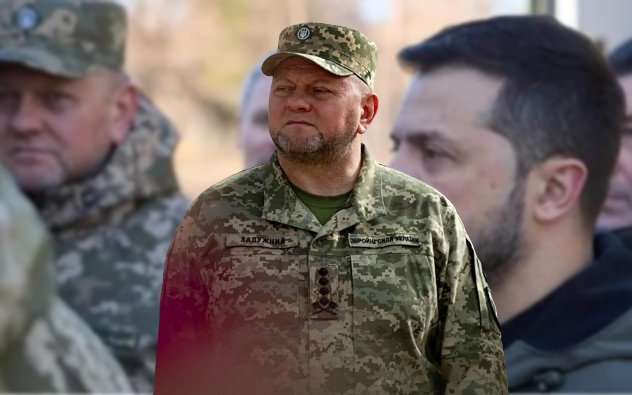
- Zelenskyy’s removal of Ukraine’s ‘Iron General’ reflects a desire for renewed leadership and strategic direction within the military but also highlights the challenges and uncertainties facing Ukraine.
- Zaluzhnyi’s removal amidst growing ammunition shortages and delays in Western military aid raises concerns about the potential impact on Ukraine’s defensive capabilities.
- The success of Ukraine’s military strategy will depend not only on internal factors such as leadership and coordination but also on external factors such as international support, diplomatic efforts, and the willingness of Western allies to confront Russia.
Ukrainian President Volodymyr Zelenskyy’s recent announcement of the removal of Ukraine’s top general, Valerii Zaluzhnyi, marks a significant shakeup in the country’s military leadership amidst the ongoing conflict with Russia. This move, while not unexpected given the longstanding tensions between Zelenskyy and Zaluzhny, carries both risks and opportunities for Ukraine’s military strategy, political stability, and broader geopolitical dynamics in the region.
Zelenskyy’s decision to replace Zaluzhnyi with Oleksandr Syrsky, a seasoned commander with extensive experience in Ukraine’s military, suggests a strategic shift towards prioritizing loyalty and stability within the armed forces. Syrsky, at 58 years old and with a background in the Soviet-era Red Army, brings a wealth of experience to the role but also faces scrutiny for his involvement in past military operations, notably the Battle of Bakhmut. While Syrsky’s appointment may bring a sense of continuity and discipline to Ukraine’s military leadership, questions linger about his popularity within the ranks and his ability to inspire confidence among frontline troops.
The timing of Zaluzhnyi’s removal amidst growing ammunition shortages and delays in Western military aid raises concerns about the potential impact on Ukraine’s defensive capabilities. With the country already facing constraints on offensive operations, Zelenskyy may face increased pressure to demonstrate effective leadership and strategic direction in the face of ongoing Russian aggression. The success of Ukraine’s defence strategy will depend not only on technological advancements but also on effective coordination, morale, and support from international allies. Furthermore, the decision to remove Zaluzhnyi highlights the broader challenges facing Ukraine as it seeks to navigate a complex and volatile security environment, characterized by shifting alliances, competing interests, and escalating tensions with Russia.
Zelenskyy’s emphasis on the need for technological innovation and a more “technologically advanced” approach to the conflict reflects a recognition of the evolving nature of modern warfare and the importance of leveraging technological capabilities to gain an edge over adversaries. However, implementing such measures amidst the current challenges facing Ukraine’s military will require substantial investment, coordination, and adaptation to rapidly changing circumstances on the ground.
Moreover, Zelenskyy’s decision underscores the broader geopolitical implications of the conflict in Ukraine, particularly about Russia’s ambitions and Western responses. As Western leaders debate the provision of military assistance to Ukraine, Zelenskyy’s actions may influence perceptions of Ukraine’s readiness and determination to resist Russian aggression. The success of Ukraine’s military strategy will depend not only on internal factors such as leadership and coordination but also on external factors such as international support, diplomatic efforts, and the willingness of Western allies to confront Russian aggression effectively.
In conclusion, Zelenskyy’s removal of Ukraine’s ‘Iron General’ represents a significant gamble in the country’s ongoing conflict with Russia. While the decision reflects a desire for renewed leadership and strategic direction within the military, it also highlights the challenges and uncertainties facing Ukraine as it seeks to defend its sovereignty and territorial integrity. The success of Ukraine’s military strategy will depend on a combination of effective leadership, international support, technological innovation, and adaptive responses to evolving threats on the ground. As Ukraine navigates these challenges, the stakes are high not only for the country itself but also for the broader geopolitical landscape of Eastern Europe and beyond.
References:
- https://lurer.com/?p=554586&l=en
- https://niralasamajnewsviews.com/2024/02/177696/
- https://saudigazette.com.sa/article/640303
